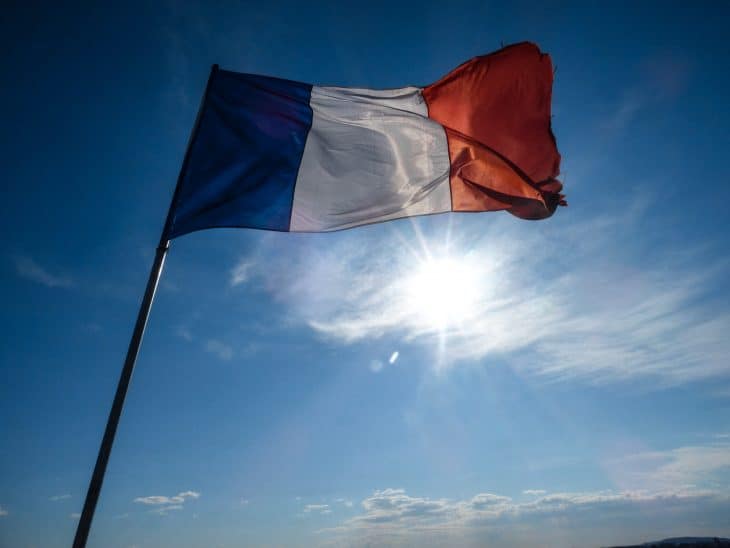
France is a known tourist destination across the world, especially for those who are into romantic places. Its beautiful chateaus, towers, and architectures make the country a perfect place to explore new things while meeting new people. More than their love for wine and cheese, this incredible country has a very rich culture and history that will make you fall in love with it over and over again. Join us as we explore these France facts like never before!
- France has almost 551,000 sq km in land area.
- Around 88% of the total population in France speak French, with the rest speaking indigenous dialects.
- As of 2019, there are an estimated 66.99 million people in France.
- France is 126% larger than the United Kingdom.
- France’s capital, Paris, is home to 2.148 million people with 105.40 km sq in land area.
- France’s national motto is “Liberty, Equality, and Fraternity”.
- Académie Française is a group in France that aims to preserve the French language. It started in 1634 and runs until today.
- The first film ever produced and shown publicly was in 1895 by Louis and Auguste Lumiere who are from France.
- Same-sex marriage is legal in France since 2013.
- Mont Black is the highest mountain in Europe found in France,
- Paris, France’s Louvre Museum is the world’s most visited museum.
- The busiest railway station in all of Europe is in Paris Gare du Nord which is in France.
- France held the 2010 UNESCO World Heritage Status in Gastronomy.
- France is home to the world’s influential thinkers and writers.
- The French celebrate April Fool’s Day with paper fish stuck on their backs.
- France is the most-visited country in the world.
- Due to the six-sided shape of the country, it’s also called the l’hexagone or “The Hexagon”.
- Camoflague was first used and introduced by the French Army in 1915 during World War I.
- France started the initiative to donate unsold food from supermarkets and restaurants to charities- the rest of the world followed right after.
- Radio stations in France get charged if they do not stream at least 40% music of French origin.
France Facts Infographics
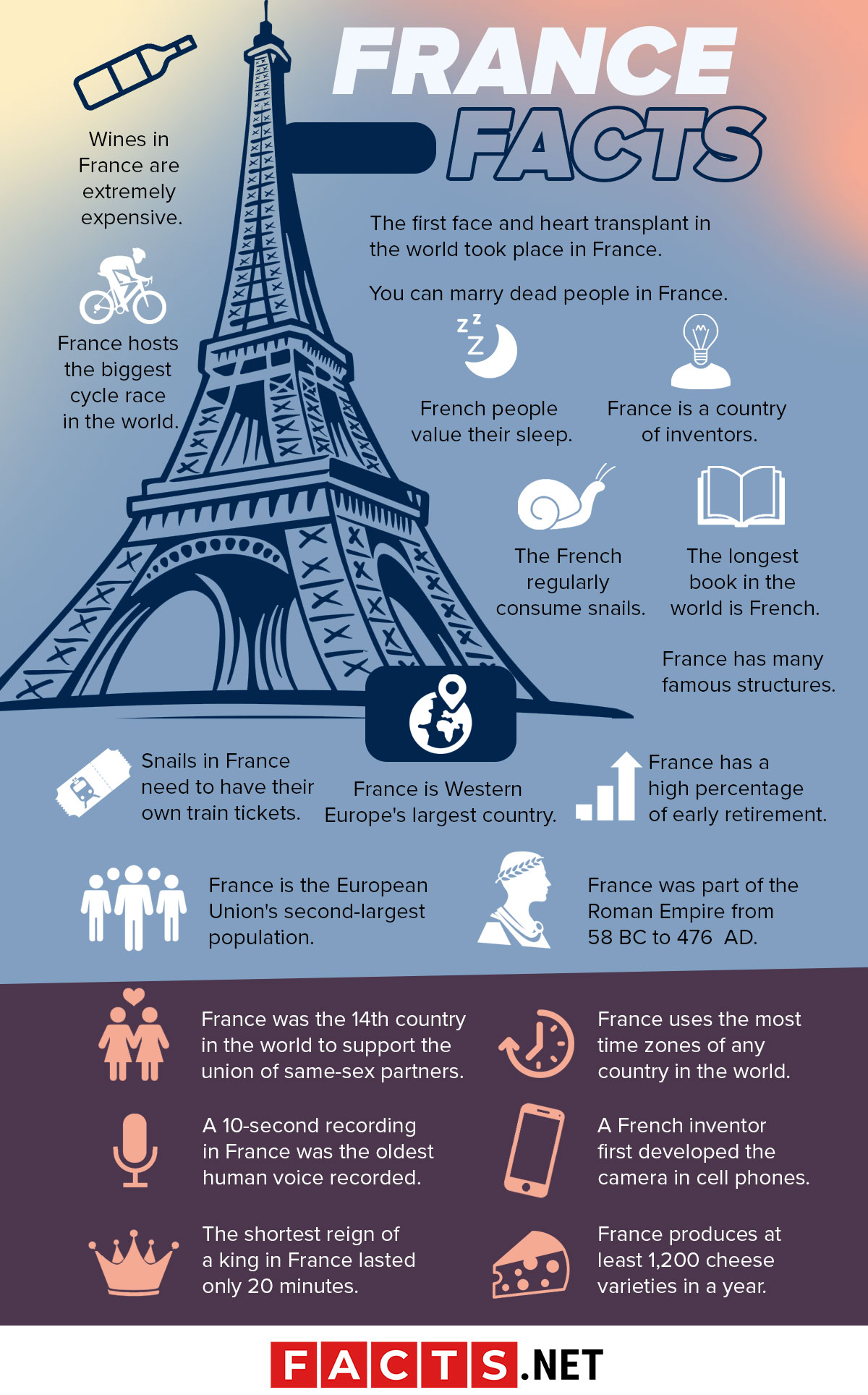
French people value their sleep.
Compared to the rest of the world, the average person in France sleeps an average of 8.8 hours. While most people from rich and progressing countries sleep for only 5-6 hours a day, the typical French citizen enjoys bedtime without hitting the snooze button.
You can marry dead people in France.
One of the least known France facts is that in French law, there are cases where you can marry a person even after their death. The country simply requires proof that the dead had a legitimate intention to marry when they were alive. After this is confirmed, the French President will then approve the marriage.
The first face and heart transplant in the world took place in France.
French surgeons performed the first face transplant in 2005 while the first heart transplant was in 2013 at Paris’ Georges Pompidou Hospital. The device mimics real contractions of the heart and runs via batteries that are 3 times more the heart’s weight.
The shortest reign of a king in France lasted only 20 minutes.
In July 1830, Louis-Antonie, who was the last Dauphin, became the King of France after his father’s abdication. However, he ended up abdicating himself in no less than 20 minutes. How’s that for crazy France facts?
France is a country of inventors.
We should thank French scientists and inventors for a lot of things we use today. The Braille System, a writing and reading system for the blind, was created by Louis Braille. The stethoscope was invented by Rene Laennec, while Alexandre- Ferdinand Godefroy holds the honor of making the first hairdryer. Meanwhile, the Montgolfier brothers are credited for the first hot air balloon flights.
France was the 14th country in the world to support the union of same-sex partners.
France’s 24th president, Francois Holland, signed the bill for same-sex marriage in 2013. This made France Europe’s 9th country to ever legalize the law. Not all of the French population were happy about the decision and thousands protested in the streets to defend their “family values”.
Wines in France are extremely expensive.
Currently, France holds the record for selling a single lot of wine for the highest price. France secured the record in 2014 after selling a bottle of DRC Romanee-Conti wine in Hong Kong for €1.45 M. With the selling price, a glass of this wine would retail for €1,619.
France hosts the biggest cycle race in the world.
Tour de France is the greatest cycle race in the world, with the first event held in July 1903. Since then, France held the competition in July, running for 23 days straight each year. Annually, cyclists would compete on being the first to finish the 2,000 mi race around France. How’s that for cool France facts?
France produces at least 1,200 cheese varieties in a year.
The French are devoted to their love for cheese. For them, it is an ancient form of art that dates back to 500AD. With this, France produces tonnes of cheese in the billions all year round.
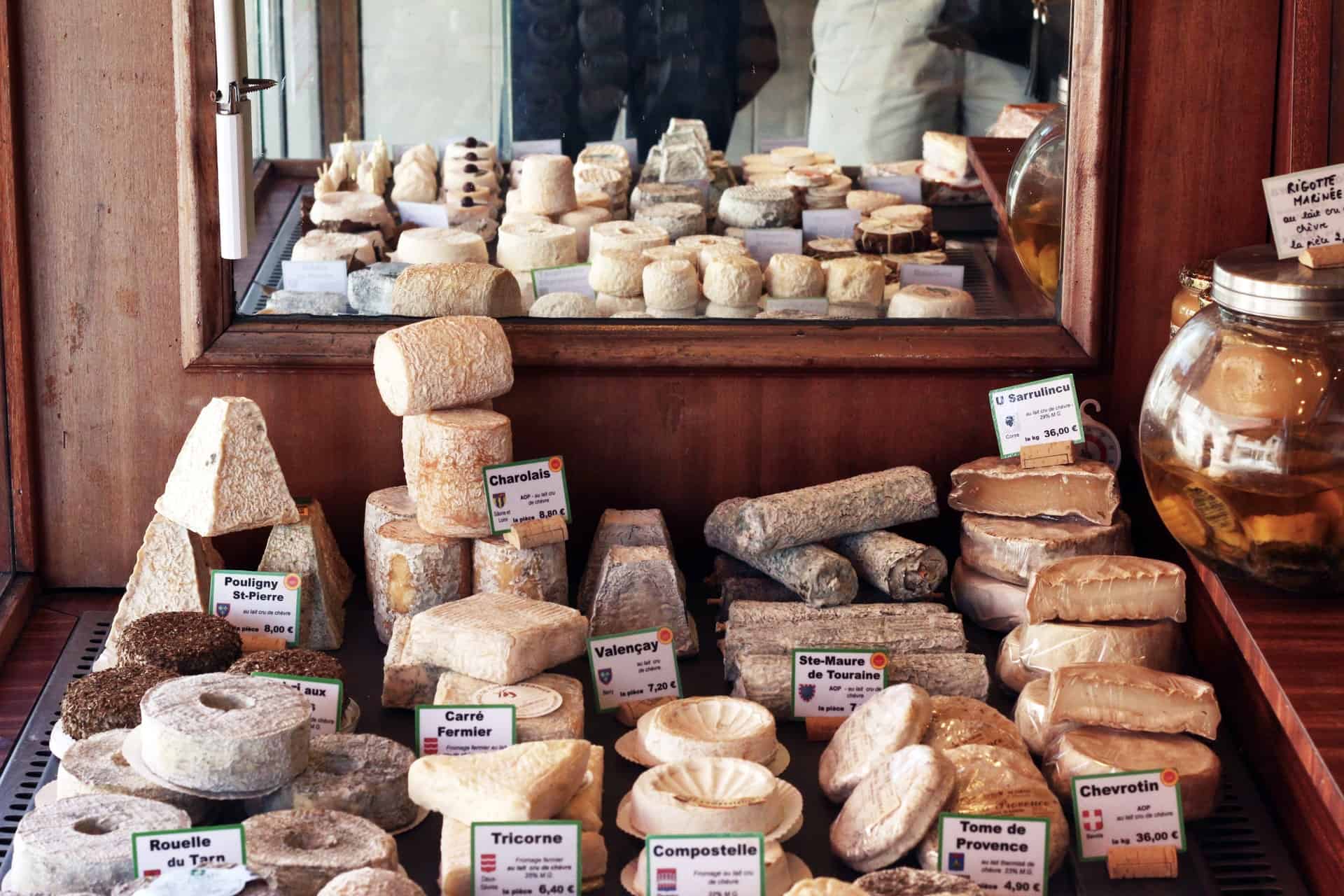
A 10-second recording in France was the oldest human voice recorded.
The oldest existing recording of a human voice dates back to April 9, 1860. Recorded by French inventor Edouard-Leon Scott de Martinville using a phonautograph, the audio featured the song Au Clair de la Lune. To this day, the 10-second audio clip remains the oldest recorded human voice in history. Definitely one of the creepiest France facts to date.
The French regularly consume snails.
As a country known for its fine cooking, you may be surprised that escargot or snails make up a big part of French cuisine. In total, France consumes around 30,000 tonnes of snails in a year. Their common French delicacy is snails served with butter, garlic, and parsley.
Snails in France need to have their own train tickets.
One of the more interesting France facts is that the country requires train tickets for snails. Snail owners who smuggle their pets or supply of snails would be subject to hefty fines once caught.
The longest book in the world is French.
A French writer, Marcel Proust, published the longest book in the world called Remembrance of Things in the Past or A la recherche du temps perdu has over 3,000 pages. It has hundreds of thousands of plots and strands. In 1913, the book’s first volume got published.
France has a high percentage of early retirement.
The Organization for Economic Co-operation and Development (OECD) is an organization that aims to make better policies for its partner countries. Out of all the OECD countries, France ranks 12th among countries whose workers retire young.
In France, males have an average retiring age of 59.7, while women usually retire at 60. French citizens can claim their state pension as early as 62 years old, which is the world’s lowest age of retirement.
France is the European Union's second-largest population.
Next to Germany, France holds second of the largest population covering at least 13% of the EU. It has the highest rate of birth in 2014, too.
France is Western Europe's largest country.
Aside from serving as the gateway to Europe’s Southern and Northern regions, France is also Western Europe’s largest country. It has lengthy borders touching Belgium, Germany, Spain, the Pyrenees Mountains, and the Atlantic Ocean.
France was part of the Roman Empire from 58 BC to 476 AD.
From 700-500 BC, the Celtic Gauls arrived in France. However, Julius Caesar defeated them, making France a part of the Roman Empire. Throughout this period, kings ruled for many centuries until the French Revolution in Bastille in 1789. Now, France officially functions as a democratic republic.
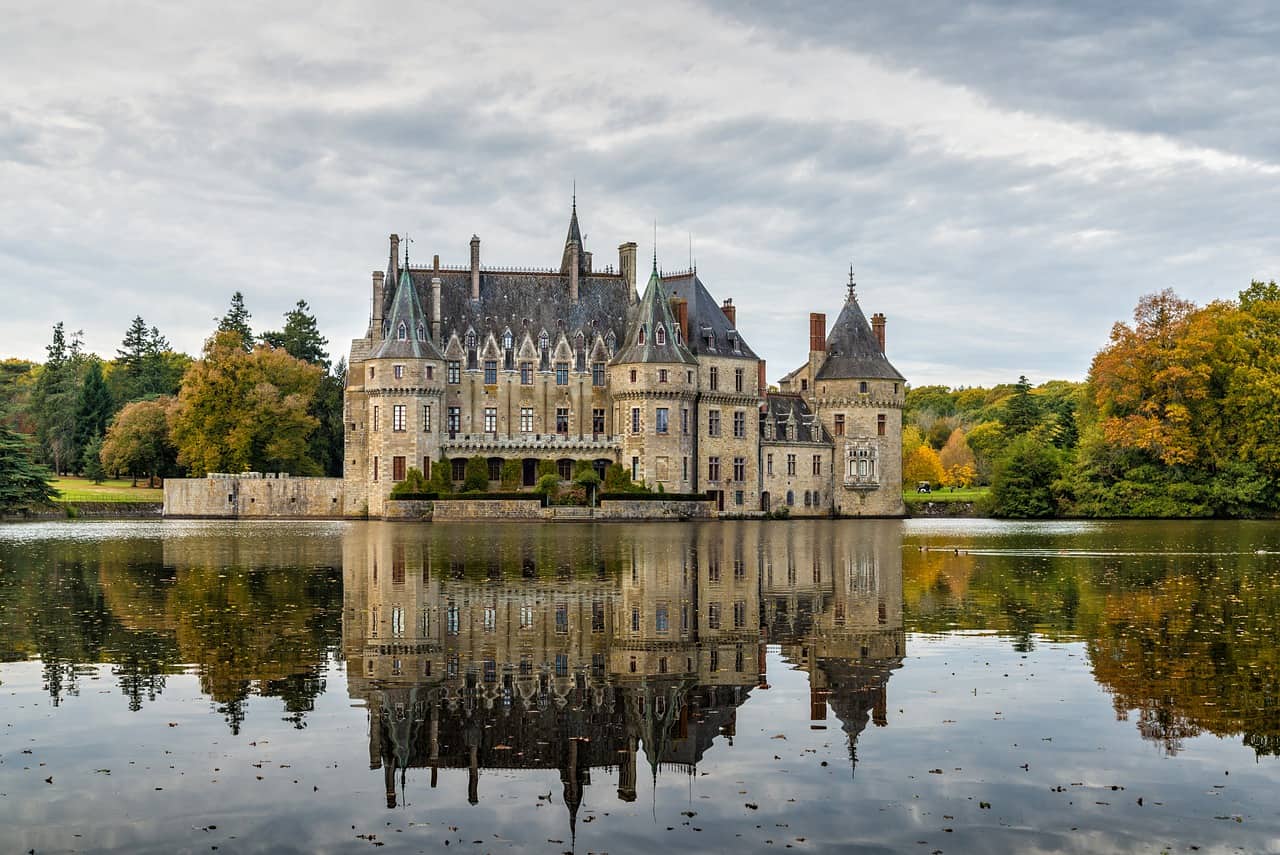
France has many famous structures.
France is not only home to the greatest writers, inventors, and thinkers. The country also prides itself in many iconic landmarks such as the world-famous Eiffel Tower, Montmartre, Notre Dame, Louvre, the River Seine, and the Arc de Triomphe. In 2016 alone, France had 82.6 million visitors all across the world – which is 7 million more tourists than Spain and the US.
France uses the most time zones of any country in the world.
Since they hold territories in many parts of the world, France has 12 official time zones. While the mainland territory of France in Europe only uses one time zone, their other territories all over the continent span 12 different time zones. These areas include Martinique, Reunion och New Caledonia, French Polynesia, French Guiana, and Guadeloupe. Definitely one of the most interesting France facts to date.
A French inventor first developed the camera in cell phones.
In 1997, French local Philippe Kahn invented the first cell phone camera. Intending to document his wife’s birth, Kahn created a software and hardware interface with his Motorola StarTAC flip phone, a Casio QV-10 digital camera, and a laptop. Truly, one of the most amazing France facts!
Death by guillotine was France's official method of execution.
The French guillotine was designed to behead those with death sentences in 1792. The device utilizes an upright and tall frame with the blade on top. Luckily in 1981, this form of death penalty got abolished.
Impotence was a crime in France.
In 17th century France, men may be charged with a crime if found unable to get an erection. If a husband exhibits impotence, their wife can file a divorce. If the husband objects, the issue can only be settled when they have intercourse in front of a judge. Luckily for men, the law was abolished in 1677. Truly one of the most obscene France facts that we have heard today.
Public transportation was first introduced in France.
Before it was a part of our everyday life, Blaise Pascal launched the very first forms of public transport in the 1660s. The earliest form of public transport feature horse-carried wagons with fixed times of departure.
Women were once not allowed to wear pants in Paris.
We have already established that France had some of the most bizarre laws, and this one does not disappoint. Namely, a law in 19th century France prohibited women from wearing pants around Paris. If caught, offending women would be charged with a fine. Surprisingly, the law had not been not abolished until the year 2013. How’s that for shocking France facts?
France also holds the record for the world's oldest person.
French local Jeanne Calment was the world’s oldest person to have ever lived on Earth. When she died on August 4, 1997, she was 122 years and 164 days old. To date, she still holds the record for the oldest person to have lived.
France is the world's biggest producer of wine.
Good news for wine lovers out there: France produces at least 50 billion hectoliters of wine every year. In fact, there’s actually a yearly competition between Italy and France to see which country produces the highest number. But so far, France always came on top. Now, that’s an amazing example of France facts.
Marseille is France's oldest city.
Marseille is the oldest and second-largest city in France. It was founded in 600 BC. One of the interesting things about this place is that they get to have 300 days of warmth and sunshine in a year! Talk about sunny France facts.
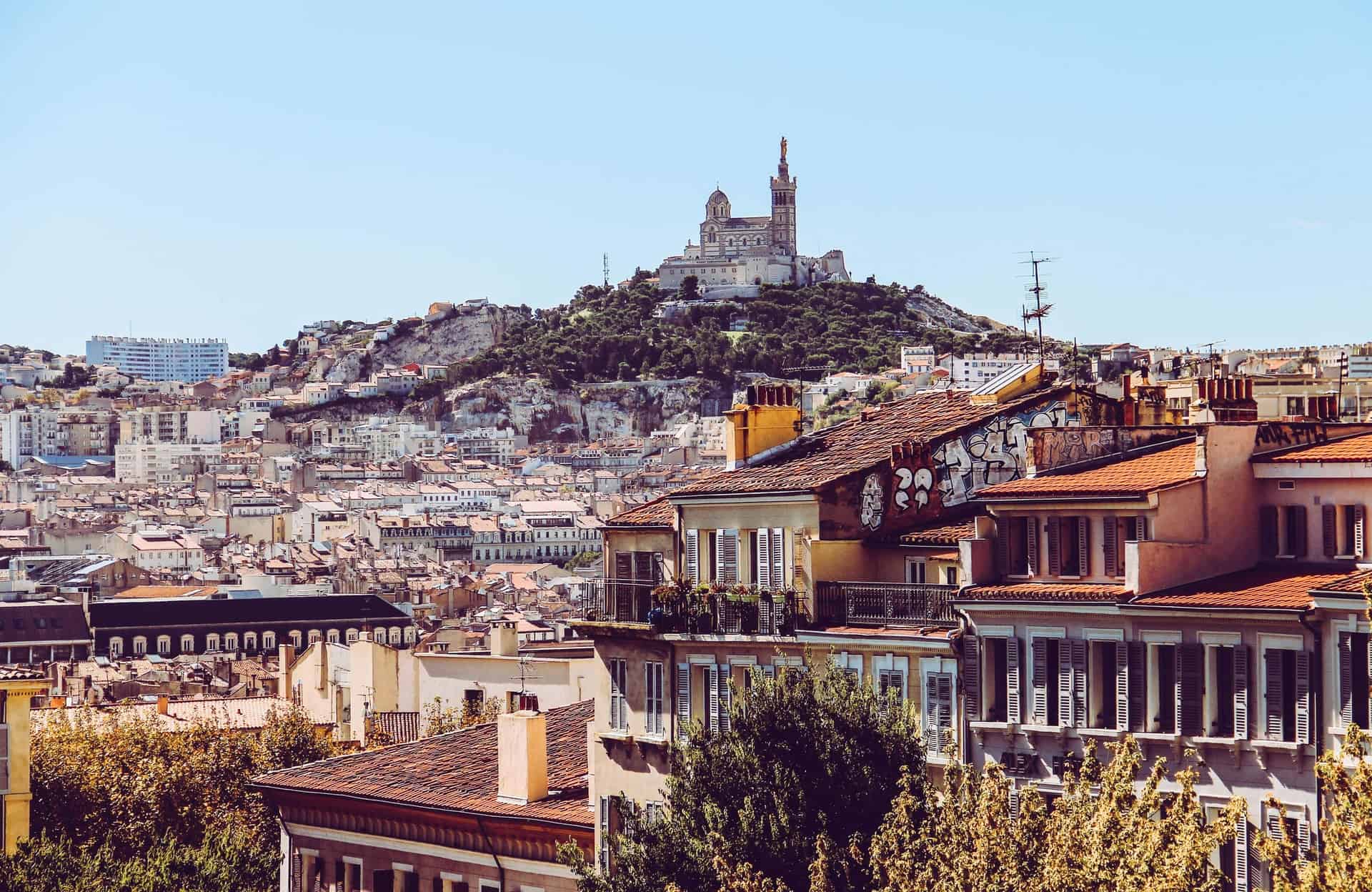
The French flag is also tricolor.
The country’s flag features a simple design of 3 colors — blue, white, red. France’s current flag was first used in 1794 during the French revolution. Since then, it became France’s official flag.
Paris was originally called Lutetia Parisiorum.
Paris used to be a Roman town called Lutetia of the Parisii. Due to its baths, temples, theaters, amphitheaters, and forums, this area was considered among the wealthier parts of town. After the fall of the Western Roman Empire, it was then called Parisius, eventually becoming Paris.
The French word "Salut" is both a goodbye and a hello.
It’s universally agreed upon that the French language is quite complicated. For example, the word salut can both be used as a goodbye and a greeting. If you visit France, your interactions with the locals may begin and end with the same words.
The Eiffel Tower in Paris was once unappreciated.
Named after the tower engineer Gustave Eiffel, the Eiffel Tower received a lot of backlash and bad comments when it was first constructed. Many locals deemed the tower as very ugly. Eventually, the tower received international attention and is now one of the most visited places on Earth.
Not everyone in France speaks French.
Although the majority of the French population speak the official language, some of those who live near the borders of Italy and France speak very fluent Italian. This is one of the France facts that make us appreciate the country more.
French is a Romance language.
Do you remember being asked what languages you think are the most romantic? In reality, there is what we call Romance languages. In fact, French is one of the romance languages in the world, along with Spanish, Portuguese, Romanian and Italian. Of all these languages, their common denominator is having Latin origins.
Hitler wanted to tear down the Eiffel Tower.
During World War 2, Germany occupied areas of France. Their leader, Adolf Hitler, asked to have the Eiffel Tower destroyed. His orders were never completed and to have their revenge, French fighters cut off the elevator cables so that Hitler and his men would be forced to walk and climb the stairs to reach the top.
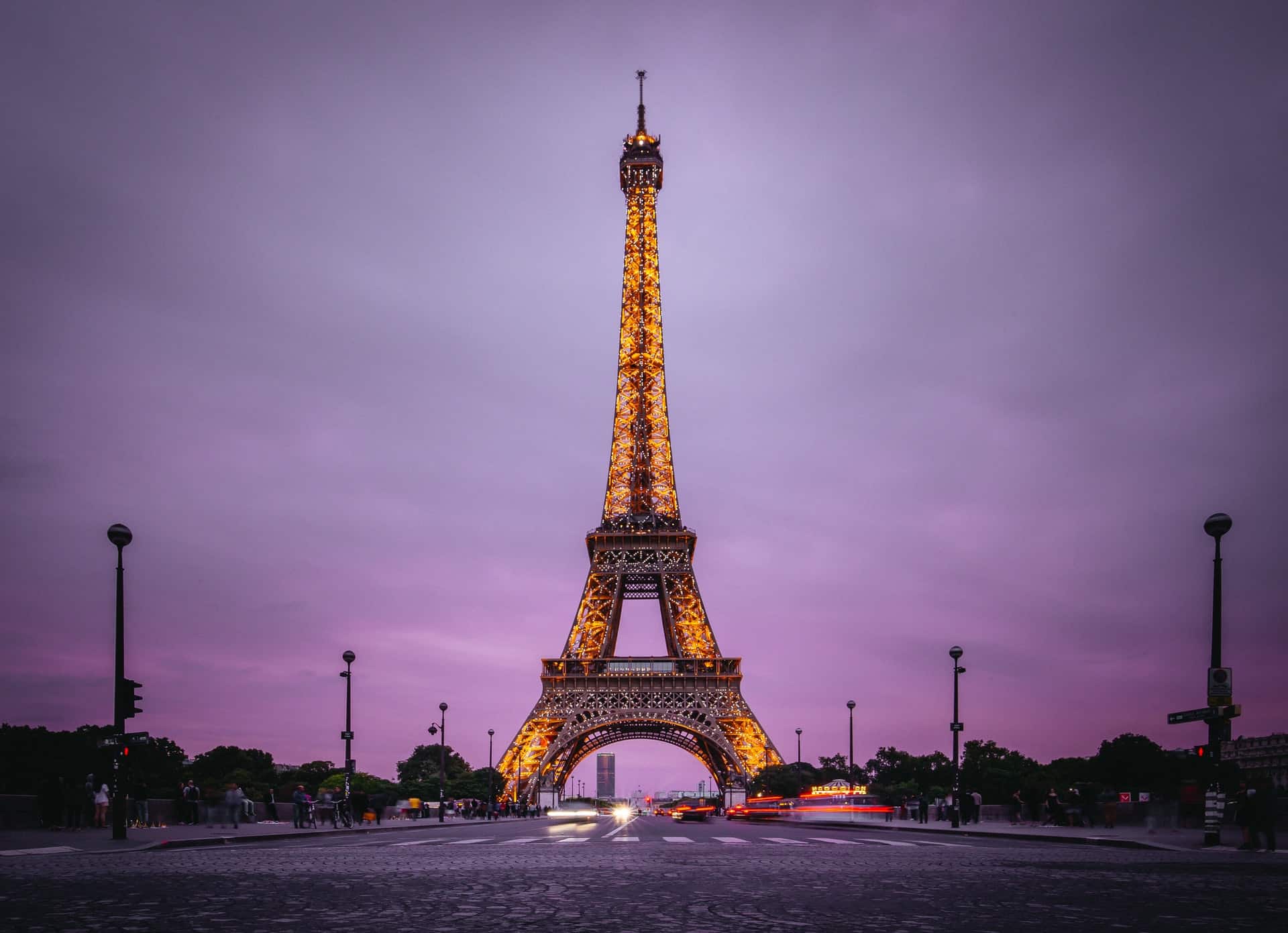
France is not a French word.
France was originally called Gaul, but after the Gauls were destroyed by the Germanic barbarian tribes, “Frank” was used in its place. The term translates to “free”. Eventually, it evolved into France and became its name since then.
The youngest president in France swore into office when he was 39 years old.
In 2017, Emmanuel Macron became the youngest French President at 39 years old. He was also the youngest head of state since the reign of Napoleon.
The Muslims of Paris protected French Jews during the World War.
During the occupation of Nazis in France, a mosque in Paris protected the French Jews by handing out identifications that say they are Muslims. A French Film titled Les Hommes Libres (Free Men) shares the story of how a mosque rector helped French civilians. Witness the heartfelt story for yourself here.
France had the first automobile license plates.
The French were always innovative and forward-looking. With this, they introduced the license plate concept in 1893 for cars and automobiles, which the rest of the world then adapted.
France has the lowest obesity rates in Europe.
Although France is the culinary mecca of the world, France has the lowest obesity rates in Europe. It’s the lowest among the OECD countries with an obesity ratio of one in 10 French citizens. However, reports show that overweight rates may increase by 10% within the next 10 years.
Taxi drivers in France needed to pay a huge sum to get their license.
One of the pricey France facts is that a taxi driver needed to pay at least €200,000 in order to get their license. The French government implemented this to prevent license holders from leasing their licenses to taxi company. However, the policy has slowly changed since October 2014. From then on, the government issued renewable but non-transferable licenses.
France bags the world's most Nobel Prizes in the field of literature.
With 17 Nobel Laureates in Literature, France has the most number of winnings. They’re also one of the top countries to have awards in Physiology, Medicine, and Physics. IT’s no wonder why France always tops the world’s most inventors and thinkers.
You cannot call it a legitimate Champagne if it's not from Champagne, France.
In France and other European countries, it’s illegal to call sparkling wines champagne if it does not come from France’s Champagne region. If it’s produced anywhere in the world other than Champagne, it’s best to just call it sparkling wine.

France houses several UNESCO World Heritage Sites.
Courtesy will determine the cost of your cup of coffee in France.
Of all values, France places emphasis on courtesy. A coffee shop in Southeastern France named Grenoble serves its regular cup of joe. But here’s a twist: The cost would depend on how the customer ordered it. Were you polite, or were you rude? The cost is up to you. Truly one of the France facts to take note of if you plan on visiting someday.
The French saw potatoes as harmful.
Between the years 1748 to 1772, potatoes were illegal in France. The French parliament implemented this law based on their belief that potatoes cause leprosy. As strange as it may seem, the French also believed potatoes were poisonous.
Thankfully, the law got abolished and the French people then had the liberty to make mashed potatoes and other potato treats.
France's oldest bridge is called "New Bridge".
France’s Pont Neuf is the oldest bridge standing across the Seine River in Paris. It wouldn’t be such a novel fact if the name didn’t literally translate to New Bridge. The Pont Neuf’s construction started in 1578 and finished in 1607.
The French Government awards medals to those who raise their kids well.
The Médaille de la Famille française (Medal of the French Family) is an award given by the French Government to citizens and individuals who managed to raise and support children successfully. The medal comes in 3 kinds of gold, silver, and bronze.
The French government awards gold medals for citizens that raise eight or more kids, silver for six to seven, and bronze for those with four to five. The decree was passed in 1920, and reformed on 1982. Talk about inspiring France facts.
France exports luxury items.
One of the more commonly-known France facts is how France ranks among the leading exporters of luxury items in the world. With companies like Cartier, Louis Vuitton, and Chanel to boast, it’s no surprise that the country stays on top when it comes to designer brands.
Paris is the "City of Light".
Most tourists believe that one of the most romantic places on Earth is the Eiffel Tower in Paris. We cannot discredit that because aside from that, Paris is the City of Light (La Ville Lumière). It has survived a lot through the years and its motto testifies to that. “She may be tossed by the waves, but she does not sink”.It’s also called the “City of Light” because it had a major role in the Age of Enlightenment and it’s also the very first city in Europe to use gas for street lights, monuments, and boulevards.
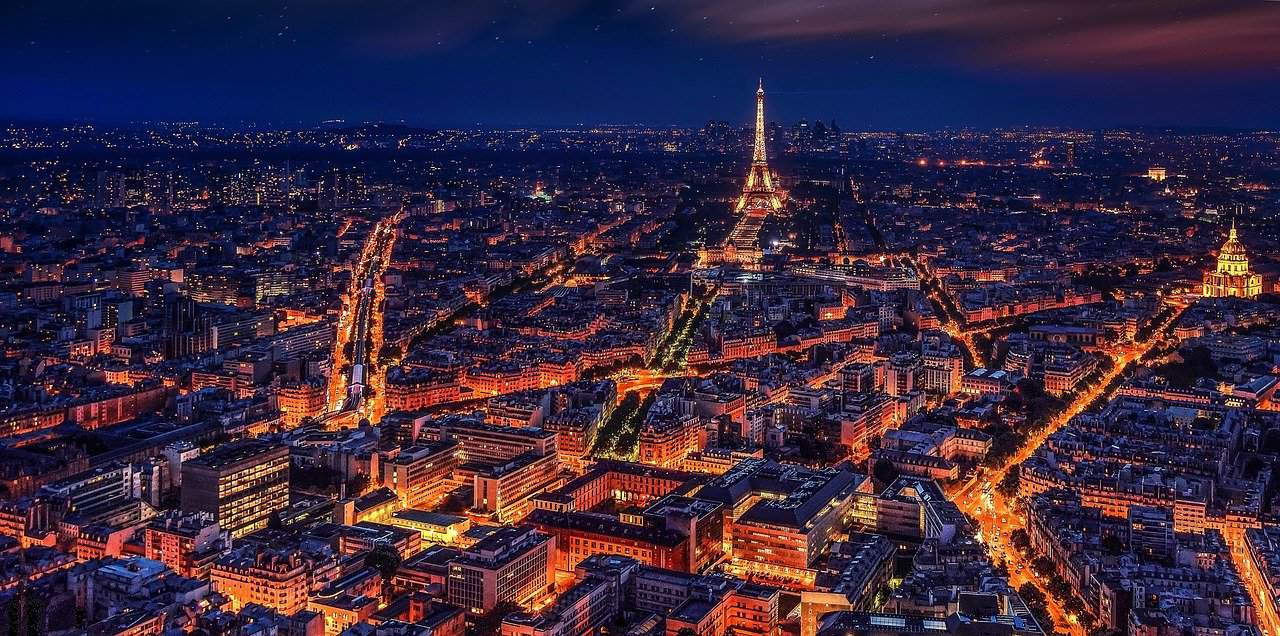
It's illegal to kiss on train platforms in France.
Although it’s known as a country of romance, a law officially forbids kissing on train platforms in France. Passed in 1910, the government implemented the law to prevent delays in service and avoid overcrowded stations. That said, it’s best to kiss your loved ones goodbye before the train arrives. Don’t the crazy laws make these France facts even more interesting?
France banned unlimited ketchup and salad dressings.
The French are health-conscious individuals and the government fully supports it. In line with this is the banning of unlimited salad dressing, ketchup, and mayonnaise in school cafeterias. Although ketchup is still served with meals, the government puts it under heavy regulation to protect the health of the children.
A city in France requires you to be polite.
They say that bonjour is the most important French word, and courtesy is everything. As a result, Lhéraule obliges its citizens to be polite when they enter the Town Hall unless you are ready to get tossed out. The law got decreed in 2011 when a civilian harassed and disrespected a public servant.
It's okay to drink alcohol at work in France.
Offices in France allow alcoholic beverages for employees. Beers, wines, pear cider, and hydromel (fermented honey drink) are totally okay. The only rule is that you drink only in moderation as your bosses may send you home if you have had too much. Better save those bottles of alcohol for the weekend!
In France, you can write your check on any kind of regular paper including toilet paper.
Under the Uniform Commercial Code, you can issue a valid check using regular paper; however, do not expect other banks to use it aside from the drawee bank that accepted it. Since it’s a special paper, it does not have a special code for automated processing so it will not run in any reader or sorter. Maybe it’s best to just follow your bank’s format of a check.
The French Foreign Legion can give you a new identity.
If you are someone who has had a haunted past from anywhere in the world, you can join the French Foreign Legion. In 1831, the organization accepted almost anyone- misfits and criminals alike. But through the years, the screening process has been more thorough. Aside from tough mental and physical requirements, you need to know how to speak French.
If you do not pass, be ready for the looming removal. To this day, the FFL still exists with the training now focused on military skills.
You can get a French Citizenship by joining the French Foreign Legion.
If you get wounded during a fight or a war defending France, you are automatically qualified to apply for a French Citizenship. By this point, the government already considers you “French by spilled blood,“worthy of becoming a citizen of the country.
Lake Geneva is France's largest lake.
Lake Geneva straddles the borders of France and Switzerland with over 583 sq km and it’s one of Europe’s largest freshwater lakes. Generally, it’s located in Western Switzerland and shares the Haute Savoie in France.

There are 40,000 chateaus in France.
France has over 40,000 abandoned chateaus. With the change in the Renaissance period, chateaus were no longer a symbol of stronghold but rather a place of leisure and work. It has also become a way for the rich to show their power and money. Many of these go unattended and sold at bargain prices for the exorbitant costs in maintenance and renovation.
France follows the Napoleonic Code as a basis for their legal system.
The Napoleonic code came into the picture after the French Revolution. The French Consulate had the civil code in 1804. The new and improved legal code gave France a set of laws to follow post-revolution. Everything that concerns colonial affairs, property, individual, and family rights are written there.
Paris does not have major road signs.
Due to being the capital of France, Paris experiences heavy traffic in its major cities. Despite this, you would not find a single “Stop”, “Do Not Enter”, or “No Left Turn” sign in the whole country.
Throughout the country, you would only find a one-stop sign in the exit of a private building company. According to Paris police, there was no need to place any stop signs as priority is given to the right within the city. Doesn’t that top the most incredible France facts today?
There was a plan to remove the Eiffel Tower
Paris is best-known for its Eiffel Tower. However, the famed structure was originally just a part of the Centennial Exposition in France in the year 1889. Originally, the French government planned to remove it after 20 years. However, they eventually opted against it since it gained so much popularity.
Many countries celebrate independence from France.
Out of all the countries that observe Independence Day, at least 26 of these celebrate their liberty and freedom from France. Throughout history, France has held the national reserves of many places including African countries.
Some of the countries that celebrate their Independence Day from France are Benin, Burkina Faso, Cameroon, Central African Republic, Chad, Republic of Congo, and Djibouti.
France has national emblems.
The French people liked to portray their values in symbols and art. Their national emblem or the national animal is a Gallic Rooster. They used this emblem in the French Revolution. It represented the French people as Gallus means rooster or “Coq” and Gallus for the “Gaul”.
Cathedral Notre-Dame de Paris is France's most visited monument.
Contrary to popular belief, Paris’ Eiffel Tower is not the most visited monument in the city. Instead, the title goes to the Cathedral Notre-Dame de Paris. In a year, the monument has at least 13 million visitors. The cathedral sits on the Island of the City and is not far from the Metro Station of the 4th arrondissement.
America's Statue of Liberty was a gift from France.
Countries around the world strive to live in peace and alliances. In order to commemorate the alliance of the United States and France during the American Revolution, the French people gave America the Statue of Liberty. It landed on American soil on June 17, 1885. The statue was a symbol of hope for many of the French liberals that democracy will always prevail and that justice and freedom for all peoples.
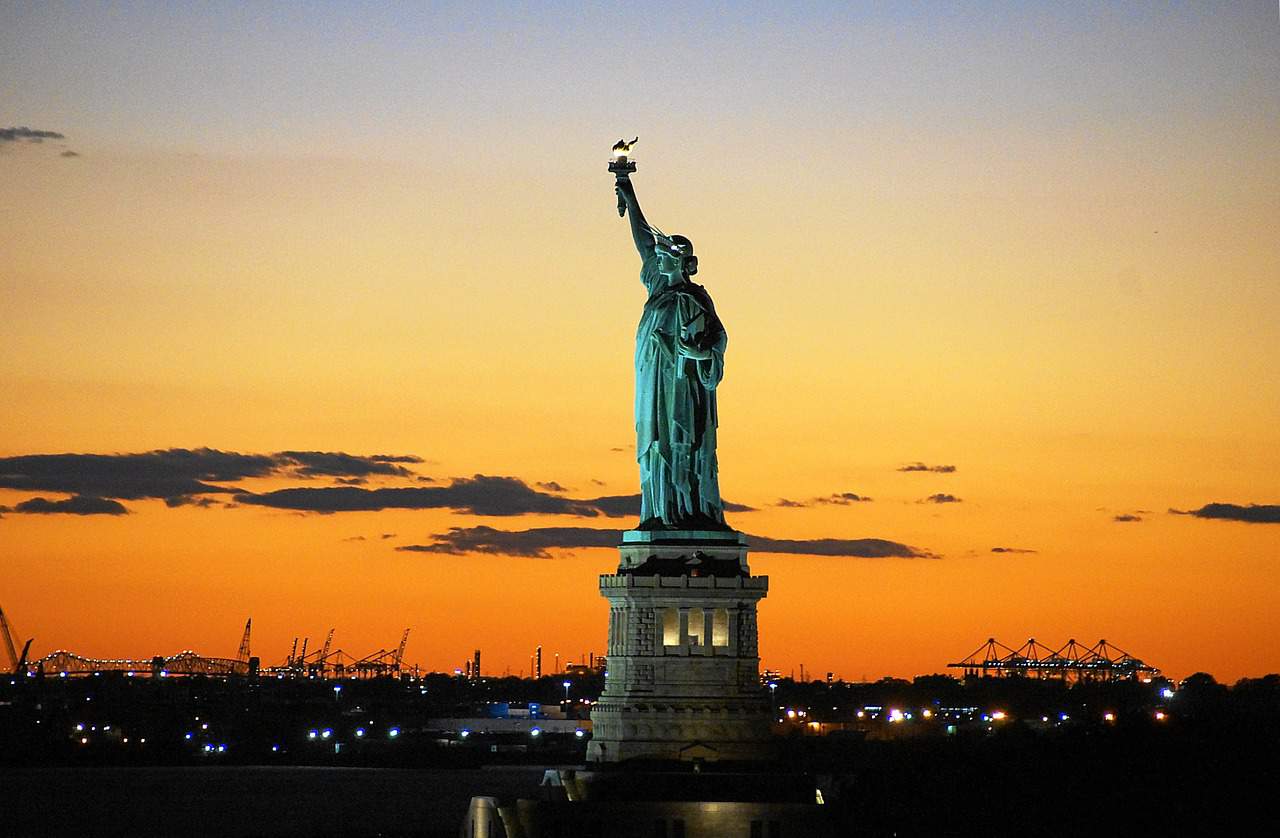
France is a leader in the perfume industry.
The French industry of perfume is nothing but legendary. Most of their brands and products are in demand across many countries. It is in demand for over 100 countries where sales are skyrocketing. In fact, 30% of all the perfume products marketed in the world are from France. Some of the most famous brands include Chanel, Estée Lauder, and Christian Dior. Now, that’s one of the most fragrant France facts today.
France has some of the largest forests.
In the year 1860, the French have discovered noticeable deterioration of the conditions of some of the forested areas in the countries. Since then, they began to do unprecedented programs of planting and reforestation to help save it. To date, the forests in France cover at least 28% of the total land area in the country.
France takes conservation very seriously.
Climate change, human destruction, and many external factors cause the extinction of many of the country’s abundant species. The French have put in a lot of effort to support conservation causes in the country and their programs of reintroducing species that are in danger of extinction. Some of these animals that benefited these programs are brown bears, storks, wolves. hawks, and lynx.
The French education system is extremely consistent.
Since the year 2000, France has had a literacy rate of 99%. This means that those aged 15 and above can read and write. Not only that, but the population can also understand simple and short statements that they need in their everyday life. The French people do not take education lightly and the numbers speak for the efforts that they have made.
French workers enjoy 5 weeks of vacation.
Most of the countries in the world work a 9-5 job with at least 40 hours of work in a week. If you live in France, their full-time workers have an official work of 35 hours in a week while part-timers for an average of 23.30 hours. Work is still on Monday to Fridays but the schedule depends on the company.
Apart from that, workers have a guaranteed 5 weeks of vacation in a year. French employees will have the leisure of sunny outings and lazy days in bed. They also observe public holidays. Definitely, one of the coolest France facts.
The Loire is France's longest river.
The longest river found in France is the Loire River. It rises in the Southern Massif Central and flows West and South for at least 1,020 km or 634 miles to the Atlantic Ocean. It enters through the South of the Brittany Peninsula. Since the river is prone to regular heavy flooding, many dikes line its banks.
Europe's oldest university is in France.
The University of Paris or the “La Sorbonne” is Europe’s first established university. It was in Paris between the 1660’s to the 1250’s. King Philip II sponsored the university but operations stopped after the French Revolution which was around 1793 and 1896. To date, the university is 763 years old.
France's currency is in Euros.
Just like all the countries covered by the European Union, France’s unit of currency is in euro. They have 5,10, 20, 50, 100, 200 and 500 euros in notes and bills and coins are also available in 1, 2, 5, 10, 20, and 50.
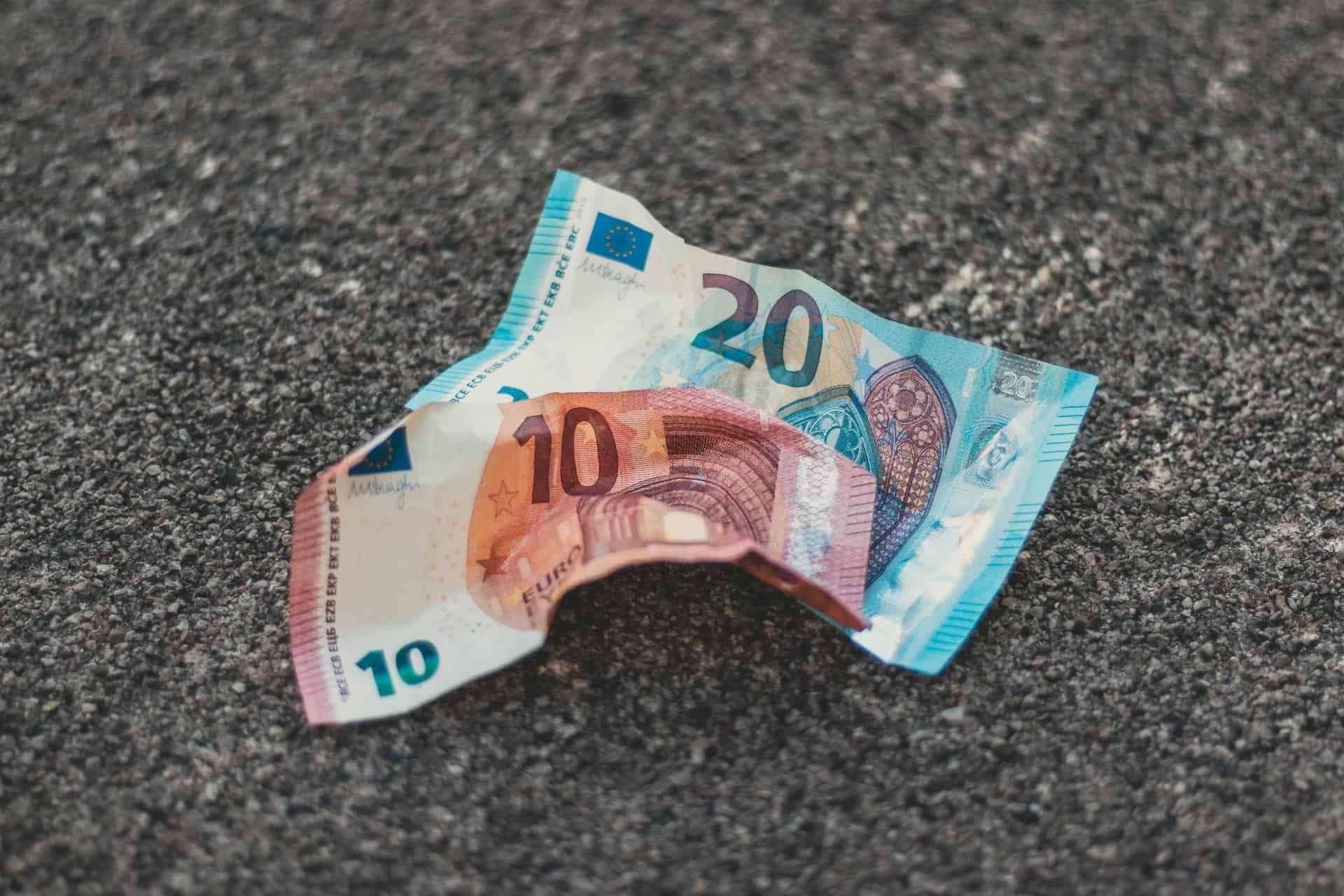
Louis XIV played a big role in France.
King Louis XIV ruled over France from 1643 to 1715. He ruled the French people in the great palace of Versailles. His leadership allowed the monarchy in France to have absolute and peak power and this made France obtain dominant power all over Europe.
To this day, his reign was the greatest in the age of the art and culture of French. Even to this day, Louis XIV is still the symbol of the established monarchy in the classical age.
France boasts of world-class cheese products.
Many regions in France are famous for their cheese production. France has the perfect vegetation and climate which makes it a great avenue to concoct unique flavors. Because of this, France produces at least 1,600 types of cheese that the French people enjoy. It’s a world export, too.
The most famous kind of cheese is the Camembert and it comes from Normandy, Camembert. It is everywhere due to its consistency and softness. It’s one of the yummier sides of France’s facts.
The Notre Dame Cathedral caught fire in 2019.
Notre-Dame de Paris or the “Our Lady of Paris” is a cathedral in the medieval area in the 4th arrondissement of Paris. It’s a French Gothic building and architecture that is a treasure in France. It’s also one of the famous Paris symbols and at least 13 million pilgrims and visitors visit the cathedral every year.
On April 15, 2019, the cathedral tragically caught fire. According to prosecutors, the fire might have been caused by an electrical fault or a cigarette fire.
Cannes is home to France's rich and famous.
You might have heard about the yearly Cannes Festival. Throughout France, the city of Cannes is known among the famous and the rich, with several conferences, luxury hotels, and restaurants.
Among these features, Cannes is known for the commune in the department of Alpes-Maritimes that hosts the Cannes Lions International Festival of Creativity, Cannes Film Festival, and the Midem.
Former French colonies become immigrants in the country.
Immigrants that sett;e in France usually come from their colonized countries. This expanded the cultural diversity of France. The country has the third-largest immigrant percentage in the world next to Canada and the United States.

France is Europe's leading agricultural sector.
The moderate climate seems to be working for the growth of plants and vegetables. As a result of their abundant and usable amount of farmland, they are Europe’s leading country when it comes to agriculture and farming. Meanwhile, there are at least 700,000 active farms in France.
France has the highest life expectancy rate.
One of the least known France facts is that compared to the rest of the world, France has the highest life expectancy rate. In France, men can live for an average of 78 years while women for 84 years. On a global scale, men live on an average of 69 years old while women at 74. This means that compared to other countries on the planet, France has the healthiest people.
Was this page helpful?
Our commitment to delivering trustworthy and engaging content is at the heart of what we do. Each fact on our site is contributed by real users like you, bringing a wealth of diverse insights and information. To ensure the highest standards of accuracy and reliability, our dedicated editors meticulously review each submission. This process guarantees that the facts we share are not only fascinating but also credible. Trust in our commitment to quality and authenticity as you explore and learn with us.


